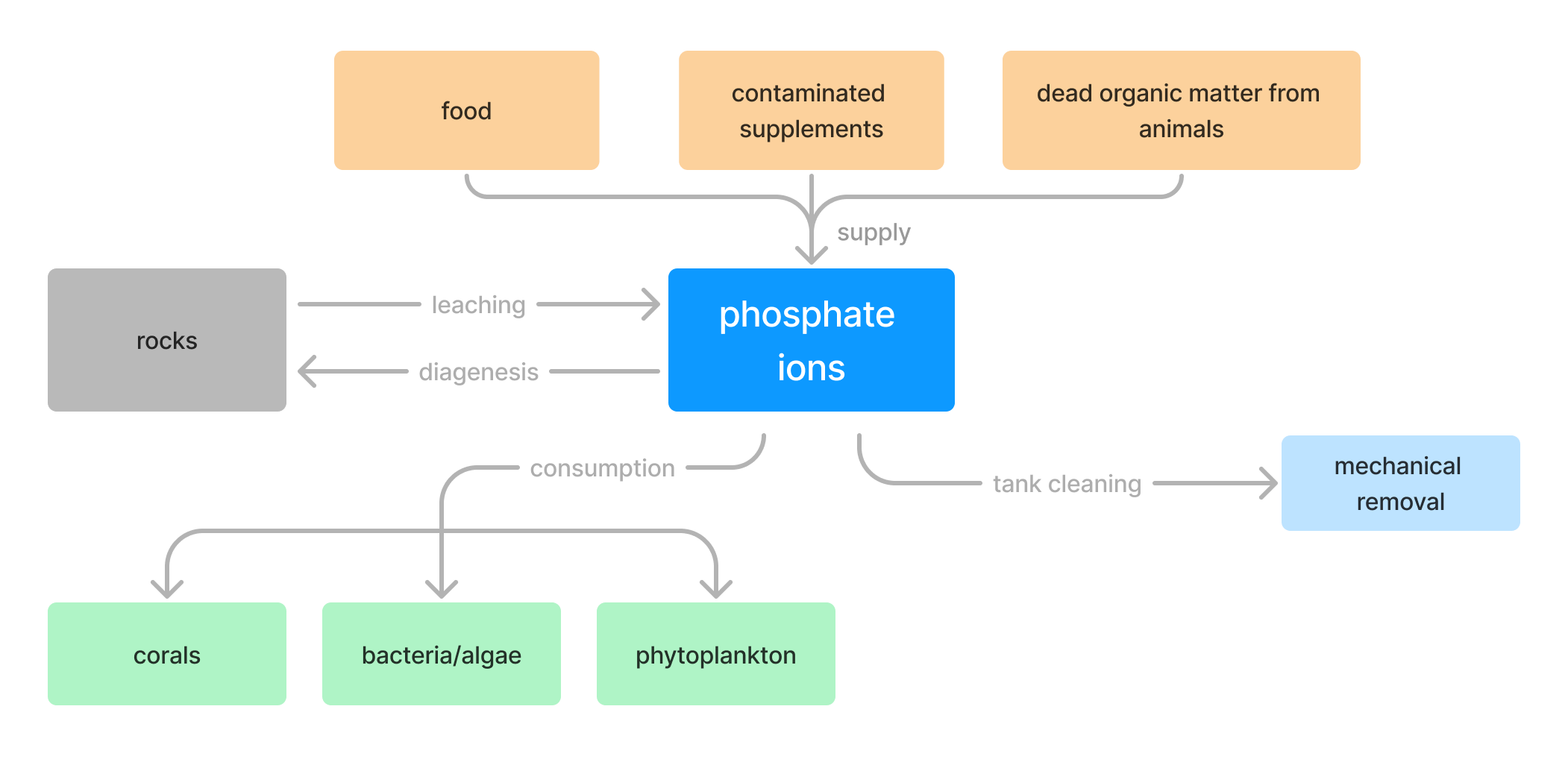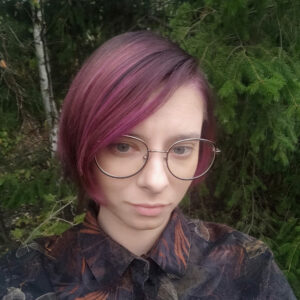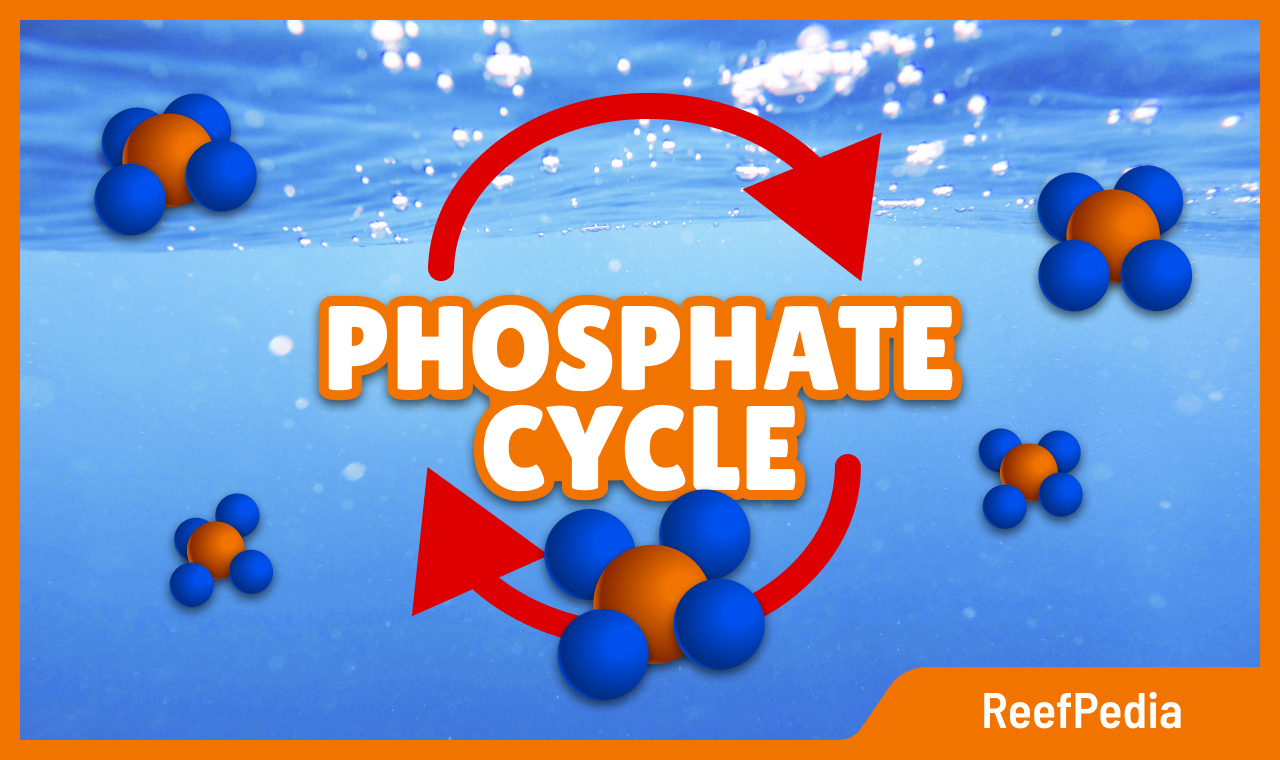Table of Contents
Phosphorus as an element
Phosphorus in nature acts as a macroelement, necessary for the functioning of cells. It is part of nucleic acids, phospholipids and many energy-transferring compounds, such as ATP (the main energy carrier in cells). Phosphorus is also essential for photosynthesis and for the emergence of new life in every ecosystem.
In a marine aquarium, we will be interested in phosphates. Phosphate levels rise due to uneaten food and aquarium animal feces.
Other sources of these compounds can also be rocks, soil or contaminated salt and water chemistry preparations. The death of living organisms, which we don’t notice in time, may increase the discussed parameter. Phosphates do not pose a direct threat to fish, but their increasing levels can be dangerous for corals.
The phosphate cycle
In the natural environment, the phosphate cycle is a closed cycle. Naturally, in nature, phosphorus is found in rocks and mineral deposits. When rocks weather, this element is released in the form of phosphate ions. Phosphates come in three forms: orthophosphate, metaphosphate (or polyphosphate), and organically bound phosphate.
Phosphates also get into the environment from the remains of plants and animals, along with sediments and sewage carried by rivers to the seas and oceans. In these forms, phosphorus is absorbed by microorganisms and phytoplankton that are part of the food of other organisms.
In marine aquariums, the phosphate cycle is an open cycle, which means that phosphorus is mainly supplied from the outside. The most common sources of phosphorus in this context include:
- Food
- Contaminated supplements
- Dead organic matter from animals (e.g., a deceased fish)
- Leaching from rocks

It is primarily removed from the tank through:
- Consumption via active enzymatic transport, where it serves as food for microorganisms, bacteria, algae, and corals, becoming a part of their cells in the form of organic compounds.
- It can also be manually removed along with bacterial and algal sediments.
Consumption of phosphorus by corals
Inorganic phosphate ingested by corals accumulates in zooxanthellae cells, where it is incorporated into ATP and nucleotides (basic elements of DNA and RNA), which are then largely translocated to host cells. In host cells, phosphorus is mineralized to PO4, which is re-consumed by zooxanthellae. In this mechanism, the phosphorus cycle is a semi-closed nutrient cycle in symbiotic animals, which reduces the loss of nutrients to the water. Even in this case, some of the phosphate and ammonium ions are excreted into the water. This cycle makes the uptake of phosphorus by corals small and difficult to determine. In the case of low phosphate values in water, uptake and release are in equilibrium and it is difficult to determine them precisely.
If you want to learn more about the flow of compounds between zooxanthellae and corals, I recommend reading the dedicated article.
I invite you to discuss the phosphate cycle in a marine aquarium on the Social Reef platform. Here you’ll find experts from around the world who are willing to share their knowledge and experience.
About Author

Agata Łobocka
I’m an industrial biotechnologist by education. I’m fascinated by microbiology and the influence of the microworld on everything that surrounds us. Professionally, I create products based on microorganisms that are more environmentally friendly than classic, popular preparations.
Before I started my adventure at Reef Factory, I was widely interested in freshwater aquaristics. In the world of marine aquaristics, I was most fascinated by the huge network of dependencies created by corals with their symbiotic microorganisms. These relationships perfectly show that organisms need their microfriends to function in health, and every element of this relationship benefits from it.
Privately, I’m interested in new technologies that counteract the negative impact of man on the environment. I'm also into self-development, cognitive science and popular science literature. I like to spend my free time actively, surrounded by beautiful nature.
I hope that my articles from the Biology section o ReefPedia will help you better understand the life in a marine aquarium.

